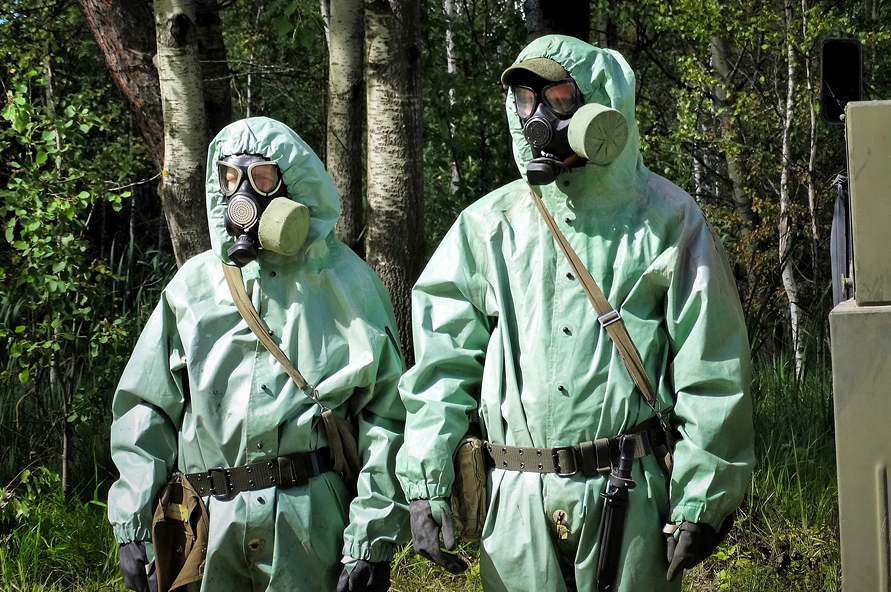EN 13274 Respiratory Equipment Resistance, Flammability and Impact Testing
The EN 13274 standard is a cornerstone in the assurance of safety for respiratory protective equipment (RPE) used across military environments. This European standard ensures that RPE meets stringent requirements regarding resistance to chemical agents, flammability and impact resistance. It aims to protect personnel from exposure to hazardous materials such as toxic chemicals, biological agents, and particulates.
Compliance with EN 13274 is crucial for military applications where the safety of soldiers cannot be compromised. The standard provides clear guidelines on how to test the performance of RPE under various conditions. This includes resistance tests that evaluate the equipment's ability to withstand chemical agents, flammability assessments to ensure the material does not ignite or burn easily, and impact testing which simulates potential impacts from falling objects.
The testing process involves rigorous procedures where samples are subjected to simulated real-world scenarios. For instance, in the resistance test, a sample of RPE is exposed to different chemical agents to determine its permeability level. Flammability tests assess how quickly materials ignite and burn under controlled conditions. Impact tests measure the durability of the equipment by simulating the effects of impacts.
Compliance with EN 13274 not only ensures that military personnel are protected but also contributes significantly to operational efficiency. By ensuring that RPE meets these standards, forces can operate in hazardous environments without fear of failure due to equipment defects. This enhances mission success rates and minimizes risks associated with compromised protective gear.
The standard's requirements extend beyond basic functionality; they include detailed specifications for the design, manufacturing processes, and quality control measures necessary to produce safe RPE. These standards are critical in maintaining high levels of safety across all sectors but are particularly vital in military applications where lives are at stake.
For quality managers and compliance officers responsible for ensuring that their organization meets these stringent requirements, understanding the specifics of EN 13274 is essential. This includes knowing which tests to conduct, how frequently they should be performed, and what criteria must be met for successful completion. By adhering strictly to this standard, organizations can demonstrate their commitment to safety standards internationally recognized within the military sector.
| Test Type | Description |
|---|---|
| Resistance Test | Evaluates the ability of RPE to protect against chemical agents. |
| Flammability Test | Determines if materials used in RPE will ignite or burn easily. |
| Impact Test | Assesses durability by simulating impacts from falling objects. |
The comprehensive nature of EN 13274 ensures that all aspects affecting the safety and performance of RPE are covered. This standard plays a pivotal role in safeguarding personnel involved in hazardous missions, thereby enhancing overall mission success rates while minimizing risks associated with compromised protective equipment.
Industry Applications
- Military personnel working in hazardous environments requiring protection against chemical agents and biological threats.
- R&D engineers developing new respiratory protective equipment for military use.
- Quality managers overseeing the production of RPE to ensure compliance with international standards.
| Hazardous Environment | Description |
|---|---|
| Biohazard Containment Facilities | Where personnel handle and process biological agents. |
| Nuclear Reactor Maintenance | Involves working around radioactive materials and environments. |
| Hazardous Waste Sites | Ensuring safety while handling toxic substances. |
The EN 13274 standard is particularly relevant for military personnel operating in biohazard containment facilities, nuclear reactor maintenance areas, and hazardous waste sites. In these environments, the ability of respiratory protective equipment to resist chemical agents, withstand flames, and endure impacts is critical.
Eurolab Advantages
We specialize in providing comprehensive testing solutions that comply with EN 13274 requirements. Our state-of-the-art facilities equipped with advanced instrumentation allow us to conduct accurate and reliable resistance, flammability, and impact tests on respiratory protective equipment.
Our team of experienced engineers and scientists ensures strict adherence to international standards such as ISO and ASTM, providing clients with peace of mind regarding the safety and efficacy of their products. We offer a range of services including initial consultation, sample preparation guidance, full-service testing packages, and detailed reports tailored specifically for your needs.
At Eurolab, we pride ourselves on delivering exceptional service supported by our extensive experience in military applications. Our expertise extends beyond simple compliance; it encompasses proactive measures aimed at continuously improving product safety standards within the industry.
Why Choose This Test
- Ensures high levels of protection against hazardous materials and environments.
- Facilitates regulatory compliance ensuring smooth market entry into relevant jurisdictions.
- Reduces risks associated with compromised protective equipment leading to enhanced operational efficiency.
- Provides robust data supporting claims regarding the performance capabilities of RPE.
Choosing EN 13274 resistance, flammability, and impact testing offers numerous benefits. It ensures that your respiratory protective equipment meets rigorous safety standards, facilitating compliance with international regulations. This enhances operational efficiency by reducing risks associated with compromised gear while providing robust data supporting performance claims.





